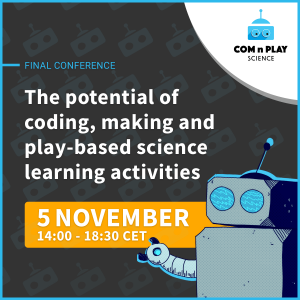Final Conference

Date: November 5, 2021
Place: Online
Registration: https://bit.ly/COMnPLAYfinal
COMnPLAY SCIENCE has the pleasure of inviting you to its Closing Conference, taking place on 05 November 2021. The Conference will take place from 14:00 to 18:30CET, and will be divided into several topic blocks to allow flexible participation.
We invite teachers, parents, policymakers and other stakeholder communities to recap the COMnPLAY SCIENCE project and its main outcome, and discuss the potential of coding, making and play-based non-formal and informal science learning activities.
Participation at the event is free of charge, but registration is compulsory. The registration is for the whole conference, but you are free to participate in any of the sessions using the same registration information.
(All times are in CET)
| 14:00-14:10 | Introduction
Dimitris Grammenos (FORTH, Greece) A brief introduction to the event. |
| 14:10-14:20 | COMnPLAY SCIENCE – Project overview and results
Michalis Giannakos (NTNU, Norway) An overview of the COMnPLAY SCIENCE project, including a presentation of its publicly available results. |
| 14:20-14:30 | Meet-and-greet COMnPLAY SCIENCE people
Participants will join breakout rooms where they will be able to meet and discuss with COMnPLAY SCIENCE partners. |
| 14:30-14:50 | Creative thinking & fun in education
Dimitris Grammenos (FORTH, Greece) A fast-paced “mini” workshop providing theoretical and practical advice for creating engaging and fun educational experiences. |
| 14:50-15:00 | The COMnPLAYer app
Nicole Salomon (ovos, Austria) A freely available app that helps children discover and learn about science and enables them to have their say on what it actually means to them. The app includes a series of entertaining stories featuring Steamo, the quirkiest AI Life Coach in the world! |
| 15:00-15:10 | Break |
| 15:10-15:30 | Using science capital to help design for equitable engagement
Heather King (King’s College London, UK) An introduction to the concept of science capital and its use in helping educators to think through their own practices to ensure that more learners, from more diverse backgrounds, are able to engage with science. |
| 15:30-15:50 | Science capital engagement tools
Dafni Konstantinidi Sofrona (Science Museum Group, UK) Examples on how you can put science capital into practice and lessons learned. |
| 15:50-16:00 | Break |
| 16:00-16:20 | Empowerment/genuine participation of children in non-formal technology education
Netta Iivari & Marianne Kinnula (University of Oulu, Finland) An introduction to what empowerment and genuine participation of children mean, and why and how those should be aimed at in non-formal technology education, including a set of guiding questions for the practitioners to ask. |
| 16:20-16:40 | Assessing fun in learning
Gabriella Tisza (Eindhoven University of Technology, Netherlands) An introduction to FunQ, a measurement tool for the assessment of fun while learning, do’s and don’ts about using the questionnaire with children, analysis and interpretation of the data. |
| 16:40-17:00 | Digital Games for Science Learning
Iro Voulgari (UoM, Malta) A fast-paced workshop which introduces games that can support science learning in primary and secondary education and discusses how they can be used in the classroom and their potential challenges. |
| 17:00 – 17:10 | Break |
| 17:10 – 18:00 | The future of education: What can be improved and how?
Round table jointly organised with Open Schooling together*
*Open Schooling together is a joint collaboration between European projects, funded by HORIZON 2020 EU Science & Innovation Programme, aiming to provide innovative ways to open schools to the community and the community to school. |
| 18:00 – 18:30 | The future of education: Discussion with the speakers
Participants will join breakout rooms where they will be able to meet and discuss with the roundtables speakers. |
 The event is organised by the COMnPLAY SCIENCE project (https://comnplayscience.eu/). COMnPLAY SCIENCE has received funding from the European Union’s Horizon 2020 research and innovation programme under grant agreement No 787476.
The event is organised by the COMnPLAY SCIENCE project (https://comnplayscience.eu/). COMnPLAY SCIENCE has received funding from the European Union’s Horizon 2020 research and innovation programme under grant agreement No 787476.